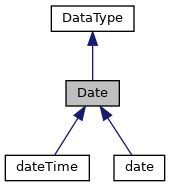The Date data type class represents a date. More...


Static Public Member Functions | |
| _.Library.Date | DisplayToLogical (_, _.Library.String val) |
Converts the input value val, which represents a date, into $H format. More... | |
| _.Library.Status | IsValid (_, _.Library.RawString val) |
Tests if the logical value val, which represents a date in $H format,. More... | |
| _.Library.Date | JSONToLogical (_, _.Library.String val) |
| Converts the JSON input date value into a Date value. | |
| _.Library.String | LogicalToDisplay (_, _.Library.Date val) |
Converts the value of val, which is in logical $H format, into a display string. More... | |
| _.Library.String | LogicalToJSON (_, _.Library.Date val) |
| Converts the Date value to the canonical JSON value. | |
| _.Library.String | LogicalToOdbc (_, _.Library.Date val) |
Converts val, which represents a date in logical $H format, into ODBC date format. More... | |
| _.Library.String | LogicalToXSD (_, _.Library.Date val) |
| Converts the Date value to the canonical SOAP encoded value. | |
| _.Library.Date | Normalize (_, _.Library.RawString val) |
| Converts val to a normalized value. | |
| _.Library.Date | OdbcToLogical (_, _.Library.String val) |
Converts val, which represents a date in ODBC format, into $H format. More... | |
| _.Library.Date | XSDToLogical (_, _.Library.String val) |
| Converts the SOAP encoded input date value into a Date value. | |
Static Public Attributes | |
| DISPLAYLIST = None | |
| The Date data type class represents a date. More... | |
| FORMAT = None | |
| The format specification for the data type's display value. More... | |
| MAXVAL = None | |
| The maximum allowed logical value for the data type. | |
| MINVAL = None | |
| The minimum allowed logical value for the data type. | |
| VALUELIST = None | |
| Used for enumerated (multiple-choice) attributes. More... | |
| XSDTYPE = None | |
| Declares the XSD type used when projecting XML Schemas. | |
 Static Public Attributes inherited from DataType Static Public Attributes inherited from DataType | |
| INDEXNULLMARKER = None | |
| Override this parameter value to specify what value should be used as a null marker when a property of the type is used in a subscript of an index map. More... | |
The Date data type class represents a date.
The logical value of the Date data type is in InterSystems IRIS $H format.
|
static |
Converts the input value val, which represents a date, into $H format.
Returns the logical ($H) value of the input string val.
|
static |
|
static |
Converts the value of val, which is in logical $H format, into a display string.
The formatting is based on the value of the FORMAT parameter.
Returns the formatted value of val.
|
static |
Converts val, which represents a date in logical $H format, into ODBC date format.
Returns the ODBC date string for the logical ($H) value val. Assume if the value is already in ODBC DATE format or ODBC TIMESTAMP format, just return tge ODBC DATE format portion of the value. This value may have come from a gateway query or is used by TO_DATE(val,"J") for Julian dates
|
static |
Converts val, which represents a date in ODBC format, into $H format.
Returns the $H value of the ODBC date string val.
|
static |
The Date data type class represents a date.
The logical value of the Date data type is in InterSystems IRIS $H format.
Used for enumerated (multiple-choice) attributes.
Used in conjunction with the VALUELIST parameter for enumerated (multiple-choice) attributes. DISPLAYLIST, if not null, represents the display values for the attribute corresponding with the logical values listed in VALUELIST.
The display values are returned by the LogicalToDisplay method.
|
static |
The format specification for the data type's display value.
The value of the FORMAT parameter corresponds to the available parameters of the $ZDATE and $ZDATEH functions, which are used to perform the formatting.
|
static |
Used for enumerated (multiple-choice) attributes.
VALUELIST is either a null string ("") or a delimiter separated list (where the delimiter is the first character) of logical values. If a non-null value is present, then the attribute is restricted to values in the list, and the validation code simply checks to see if the value is in the list.